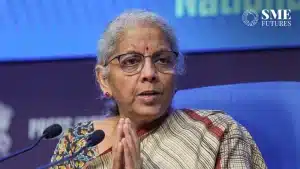As the Union Budget 2020-2021 is all set to be presented in Parliament this week, industry players from various sectors have made their demands clear. Expectations are higher from this Budget also because the economy is going through a slowdown, resulting in slower growth and demand. SMEfutures.com spoke with several industry experts and stakeholders for an overall sectoral view on the Budget.
Bring the economy back on track
While there are specific demands from every sector, one thing everyone wants from the government is to bring the economy back on track. “The current economic slump has to be tackled in smarter ways by introducing landmark policies and stronger governance which will be beneficial in the longer run. The Union Budget has to incorporate these factors to bring back the required liquidity and put the economy on track,” says Pradeep David, general manager, South Asia, Universal Robots.
The automation sector has lately become a significant contributor to India’s mission of digital empowerment, and the current government is fast-pacing the development to enable SMEs and MSMEs to further compete at a global level. Banking on high-end technology and automation for the manufacturing sector will prove to be a game-changer, also helping in stabilizing and flourishing the Indian economy, he adds.
According to the data of the International Federation of Robotics (IFR), on average 99 robots are deployed every 10,000 employees. India lags with just 4 robots per 10,000 workers, reflecting the dire need to make technology and robotics accessible to all. David feels relaxation in taxes for robotics could neutralize the slowdown and further increase the rate of manufacturing in the country, inviting more foreign direct investments (FDI) and trades.
“The measure would encourage small and medium-sized businesses to accelerate their profits, quality, and productivity, as well as contribute to the economic growth of the country,” he opines.
Steps to boost consumer demand
The country has been witnessing a dip in GDP, therefore the Budget should introduce fiscal measures in order to further boost manufacturing and production. With an intent to benefit the end-users, the measures will further profit the local manufacturing industry and augment sales, informs Mandeep Singh, CEO and executive director, JSL Lifestyle. The government should focus more on creating an investor-friendly climate as major sectors like infrastructure, aviation, automobile and Railways etc. heavily rely on this, apart from consumer demands. “It will be great if custom duties and taxes are relaxed, further providing relief to boost production and demand. With global conditions also favouring the growth trajectory, these measures will add momentum and to the current situation,” Singh recommends.
Improve infrastructure, focus on solar projects
The Indian manufacturing sector has become one of the most attractive destinations for investments. While the government has already unveiled plans to boost growth in manufacturing, construction sectors and improving infrastructure, it should ramp up its efforts in the upcoming Budget.
Goldmedal Electricals director Bishan Jain wants the government to continue with its commitment towards electrification of villages across the country. Besides that, additional efforts on solar energy projects should also be made with the right incentives – that can be a valuable avenue for income generation and also help combat climate change.
Transparency on fiscal deficit
“To build confidence in India’s data, the government needs to reveal the true extent of the Budget deficit, currently in the 3.5% range,” feels Shakir Ebrahim, founder of GoBisbo Broadcasting Network and creator of Bisbo.
“The major change should be a move to the accrual accounting system from its current actual basis. This way future freight revenues from NTPC or Coal India cannot be added to current years’ revenues, nor can payments be delayed to another accounting year to show a smaller deficit,” he adds.
Off-budget borrowings, like loans taken by the Food Corporation of India, to the tune of over Rs. 150,000 crore, and from other PSUs be included in the calculated figure. The deficit figure may double to between the 6-7% range, but markets will rally on the basis of transparency, Ebrahim shares.
Imports hitting local textile industry
South India Mills Association (SIMA) has expressed concerns over the challenges being faced by the textile industry. K Selvaraj, general secretary, SIMA said: “Textile industry has been struggling for the last four years, mainly because of the global recession, that got aggravated because of the US-China trade war – hitting the export.”
On behalf of the country’s textile industry, Selvaraj wants raw material and tax barrier issues to be addressed by the finance minister Nirmala Sitharaman. Import of ready-made garments in huge numbers lately has been affecting the domestic manufacturing. “We have been talking about Free trade Agreement (FTA) but now we have requested the government to expedite conclusion of FTA, at least, with Britain, EU and the US so that we also get some opportunities,” he added.
The Atal Bihari Vajpayee government brought two policies – technology up-gradation fund scheme and technology mission on cotton. According to Selvaraj, these two schemes are lifelines for the sector. The association is now requesting the government to bring a revised format of technology mission on cotton with a focus on technology, transfer of technology, clean cotton branding Indian cotton and cotton textile products.
Simplify GST
MSMEs contribute about 29 per cent to the Indian GDP. And with the rollout of GST, the imports have become cheaper compared to manufacturing. Thus, CMA Bhogavalli Mallikarjuna Gupta, chief taxologist at Logo Infosoft, a GST solution provider suggests additional duties or safeguard duties to be introduced that will give a fillip to the manufacturing sector and help MSMEs to sustain in the long run.
“To boost the revenue from GST, the government should adopt the carrot and stick theory. It should reward the honest GST registered taxpayers by way of refund of 0.5 per cent to 1 per cent of the taxes paid, and at the same time punish the errant taxpayers by imposing hefty penalties,” Gupta suggests.
As part of the ease of doing business schemes, the government should come up with a roadmap where the taxpayers will be filing a single return at periodic intervals, rather than filing different returns for different departments at different periods. This will in turn also bring in more FDI into India, he further adds.
Similarly, other stakeholders in the technology sector demands simplification in GST processes. Cloud services company Deskera CEO Shashank Dixit believes simplification of the GST filing process will benefit SMEs. “While the GST council has taken several steps to simplify the process over the past couple of years, there still are some lingering issues such as matching of B2B invoices, uploading information on tax returns and compliance burden of SMEs.”
Also, registered small businesses spend a considerable amount of time in obtaining state-wise registration, filing of multiple returns, generation of e-way bills and maintenance of separate books of accounts for each registered entity. According to Dixit, transparency in the system will bring accuracy to the return filing process – and prepare the Indian economy for its next phase of growth.
The education sector also demands reduction in GST rate. Rohit Manglik, CEO, EduGorilla asks the Finance Minister to reduce GST rates for online education, live classes from 18 per cent to 5 per cent, making it “more affordable for professionals going for upskilling.”
“To provide a fillip to primary education, the Budget should place an emphasis on enhancing learning outcomes through teacher training as well as improving infrastructure,” he added.
Renewed focus on startups needed
Startups wants renewed focus from the government. Last year Budget missed the mark when it comes to major inclusions for the technology startup sector, says Swathi Bavanaka, Co-founder & COO, Evibe.in, a Bengaluru-based event planning startup.
Union Budget 2020-2021: India Inc demands tax reforms, steps to boost consumer demand “We are optimistically looking forward to a course correction this year. As India is becoming a hub for home grown start-ups, it would be great if the government can take this up as a priority area in the Budget, allocate more funds and announce policies that would encourage the startup sector. This will help create a more welcoming ecosystem for the industry players and catalyze innovation,” she quips.









